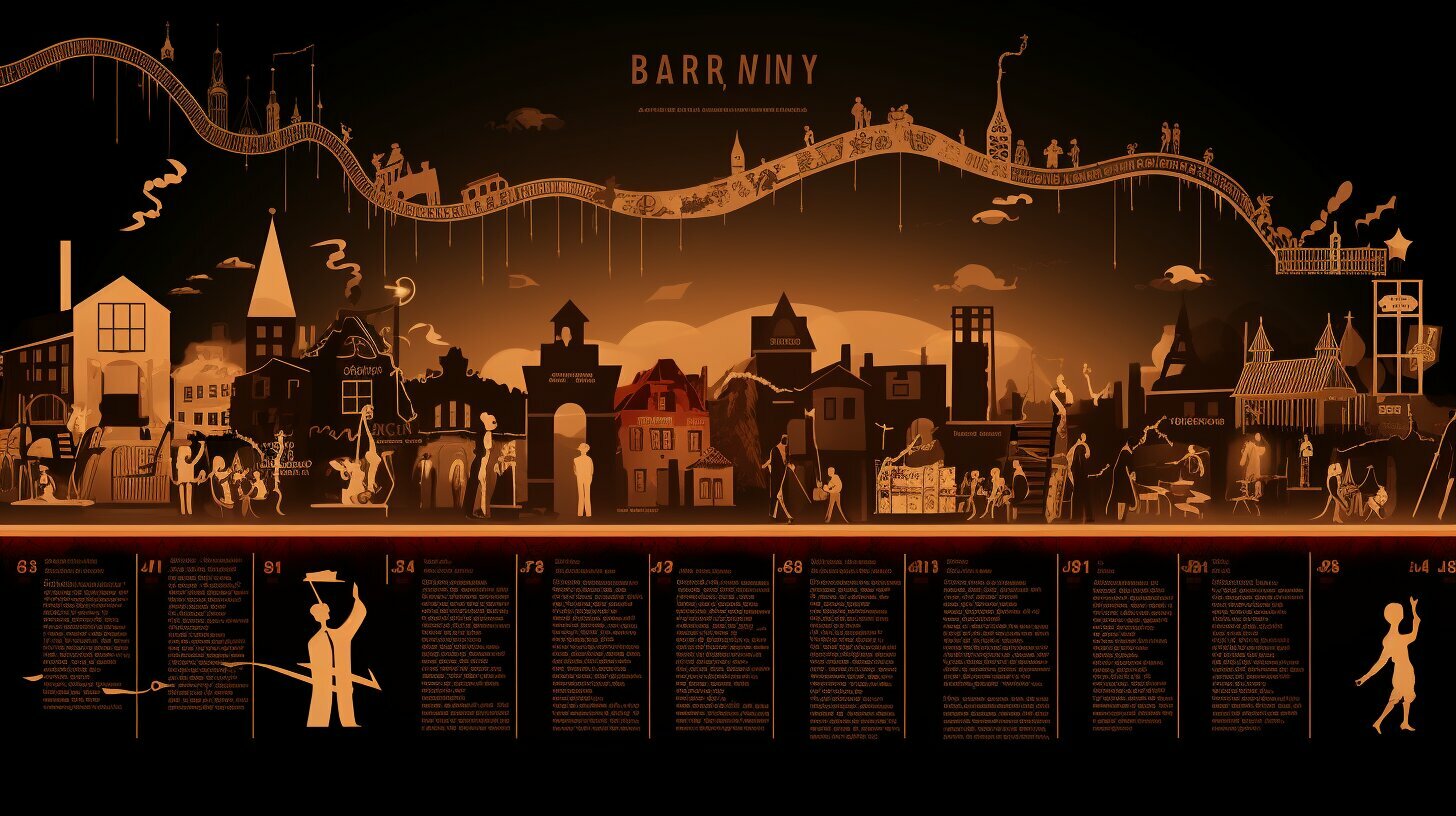Unraveling the Mystery: Why is a Bar Called a Bar?
Have you ever wondered why we call a place where we enjoy a drink and socialize a “bar”? Let’s dive into the fascinating history and etymology of this term.
Key Takeaways:
- The term “bar” is commonly used to refer to places where alcoholic beverages are served.
- The origin of the term “bar” is still uncertain, with theories suggesting it originated from the counter or barrier where drinks were served.
- Another theory suggests that the word “bar” originally referred to a railing or barrier separating the bartender from the customers.
- Regardless of its origins, the term “bar” has become synonymous with places where people gather to drink and socialize.
- The history and evolution of bars reveal their significant role as social hubs and centers of community interaction throughout different eras and cultures.
Origins of the Term “Bar”
To understand why we call a gathering place for drinks a “bar,” we must delve into its fascinating linguistic origins and explore the possible theories behind its usage. The term “bar” is often used to refer to a place where alcoholic beverages are served, but its exact origin remains somewhat of a mystery.
One theory suggests that the term “bar” originated from calling the counter or barrier where drinks were served a “bar.” This theory implies that the very structure that separated the bartender from the customers gave rise to the term that would eventually encompass the entire establishment. It’s fascinating to think that the name for these social gathering places may have originated from something as simple as the physical barrier between the bartender and the patrons.
Another theory proposes that the word “bar” originally referred to a railing or barrier that was used to separate the bartender from the customers. This theory emphasizes the significance of having a physical barrier between the two parties, suggesting that it was not just a practical division but also a symbolic one. The presence of this barrier further added to the allure and mystique of these establishments, making them distinct from other types of gathering places.
Regardless of its precise origins, the term “bar” has evolved over time to become synonymous with places where people come together to drink and socialize. It has become deeply ingrained in our language and culture, representing not just a physical location but also a sense of community and camaraderie. The linguistic journey of the term “bar” is a testament to the enduring appeal and cultural significance of these establishments throughout history.
| Possible Origins of the Term “Bar” | |
|---|---|
| The word “bar” may have originated from calling the counter or barrier where drinks were served a “bar.” | (Source: Linguistic theories) |
| Another theory suggests that the term “bar” originally referred to a railing or barrier that separated the bartender from the customers. | (Source: Etymology studies) |
The Evolution of the Term “Bar”
As language evolved, the term “bar” took on various meanings and became intricately linked to places where people gather to enjoy libations and each other’s company. The term, which is commonly used to refer to establishments where alcoholic beverages are served, has a fascinating linguistic history.
One theory suggests that the word “bar” originated from calling the counter or barrier where drinks were served a “bar.” It is believed that this term was first used in English taverns during the 16th century, where a physical barrier separated the bartender from the customers. Over time, this usage expanded to refer to the entire establishment itself.
Another theory proposes that the term “bar” evolved from the practice of using a railing or barrier to separate the bartender from the customers. This barrier, known as a “barrier bar,” not only provided a physical boundary but also served as a surface for serving drinks. Eventually, the term “bar” came to represent the entire space where drinks were served and people gathered.
Throughout history, the term “bar” has embraced different meanings and contexts. It has been used to describe a variety of establishments, from traditional taverns to modern cocktail bars. Regardless of its etymology, the term “bar” has come to symbolize a place where individuals come together to unwind, socialize, and enjoy a diverse range of beverages.
| Term | Meaning |
|---|---|
| Bar | A physical barrier or counter where drinks were served |
| Bar | The entire establishment where alcoholic beverages are served |
| Bar | A social hub where people gather to drink and socialize |
The Historical Significance of Bars
Bars have played significant roles in societies for centuries, acting as vibrant social spaces where individuals come together to forge connections, share stories, and create lasting memories. Throughout history, bars have evolved to become more than just places to consume alcoholic beverages; they have become centers of community interaction, cultural exchange, and even political discourse.
In ancient civilizations such as ancient Egypt and Greece, bars, or taverns as they were commonly known, served as meeting places for locals and travelers alike. These establishments offered a respite from daily life and provided a space for individuals to indulge in conversation and entertainment. In fact, some of the most significant historical figures, philosophers, and poets were known to frequent these ancient bars, engaging in discussions that shaped the course of civilization.
The significance of bars continued into the Middle Ages, where they acted as important gathering places for guilds and trade associations. These establishments became hubs for sharing knowledge, conducting business, and forging alliances. It was within the walls of these bars that craftsmen, merchants, and scholars would meet, exchange ideas, and lay the foundations for future innovations and societal progress.
As societies evolved, so did the role of bars. During the Renaissance period, bars became synonymous with intellectual enlightenment and artistic expression. The vibrant atmosphere of these establishments inspired creativity and fostered a sense of camaraderie among like-minded individuals. In fact, many famous artists and writers, such as Ernest Hemingway and F. Scott Fitzgerald, found inspiration within the walls of bars, immortalizing them in their works.
Today, bars continue to hold a special place in our society. They provide a space for people of all backgrounds to come together, relax, and form connections. Whether it’s grabbing a drink after work with colleagues, celebrating a special occasion with friends, or simply enjoying a night out, bars offer a sense of community and belonging. The term “bar” may have originated from humble beginnings, but its historical significance and cultural importance cannot be understated.
Table: Famous Bars Throughout History
| Bar Name | Location | Historical Significance |
|---|---|---|
| The Eagle and Child | Oxford, England | A meeting place for literary figures, including J.R.R. Tolkien and C.S. Lewis |
| The Algonquin Hotel | New York City, United States | Famous for its Round Table discussions among prominent writers and intellectuals |
| Lapin Agile | Paris, France | An iconic gathering place for artists, poets, and musicians during the bohemian era |
Conclusion
The term “bar” has stood the test of time, embracing its rich historical and linguistic roots, to become an integral part of our social fabric, evoking images of conviviality and camaraderie. From its possible origins in the counter or barrier where drinks were served, to the notion of a railing separating the bartender from customers, the term “bar” has evolved and expanded in meaning.
Throughout history, bars have held significant cultural and social importance. They have served as meeting places, social hubs, and centers of community interaction. Whether it’s a neighborhood tavern, a trendy cocktail bar, or a bustling sports bar, these establishments continue to bring people together to unwind, celebrate, and connect.
So, why do we use the term “bar” to describe these establishments? Perhaps it is because “bar” captures the essence of what these places represent – a barrier that separates the ordinary from the extraordinary, a boundary between the responsibilities of daily life and the freedom to relax and enjoy oneself. It is a term that has become ingrained in our collective consciousness, conjuring up images of laughter, clinking glasses, and unforgettable memories.
In conclusion, the term “bar” is more than just a word. It is a symbol of our desire for connection, a place where strangers become friends, and where stories are shared over a drink. So, the next time you step into a bar, take a moment to appreciate the history and significance behind the term, and raise a glass to the enduring legacy of these beloved establishments.
FAQ
Why is a bar called a bar?
The origin of the term “bar” is still somewhat of a mystery. One theory suggests that it originated from calling the counter or barrier where drinks were served a “bar.” Another possibility is that the word “bar” originally referred to a railing that separated the bartender from the customers. Regardless of its origins, the term “bar” has become synonymous with places where people gather to drink and socialize.
What are the possible origins of the term “bar”?
There are a few theories regarding the origins of the term “bar.” One theory suggests that it came from calling the counter or barrier where drinks were served a “bar.” Another theory proposes that the word “bar” originally referred to a railing or barrier that separated the bartender from the customers. The exact origin is uncertain, but these theories provide some insight into the possible origins of the term.
How has the term “bar” evolved over time?
The term “bar” has evolved over time and has taken on different meanings associated with the serving of alcoholic beverages. It has become synonymous with establishments where people gather to drink and socialize. The term has developed a cultural significance and is widely used to refer to places where alcoholic beverages are served.
What is the historical significance of bars?
Bars have a rich historical significance throughout different eras and cultures. They have served as social hubs, meeting places, and centers of community interaction. Bars have played a role in bringing people together and have often been an integral part of communities throughout history.
Why do we continue to use the term “bar” today?
The term “bar” continues to be widely used today because it has become deeply ingrained in our cultural lexicon. It represents a place where people can come together to relax, socialize, and enjoy alcoholic beverages. The term “bar” has a history and significance that has transcended time, making it a commonly used term in our modern society.
- Discovering Why Do Women Wear Lipstick: A Deeper Look - 19/12/2023
- Why Do Golfers Only Wear One Glove? - 16/12/2023
- Why Don’t Hobbits Wear Shoes? - 14/12/2023
Hi, I’m Rhiannon, the lead author behind The News Wire. As a passionate journalist, I strive to bring you the latest news and updates from all over the world. With a keen eye for detail and a dedication to unbiased reporting, I aim to deliver well-researched and informative articles that keep you informed and engaged. From breaking news to in-depth analyses, I cover a wide range of topics with the aim of keeping you in the loop. Join me on The News Wire as we explore the dynamic and ever-changing landscapes of global events, uncovering the stories that matter most.






